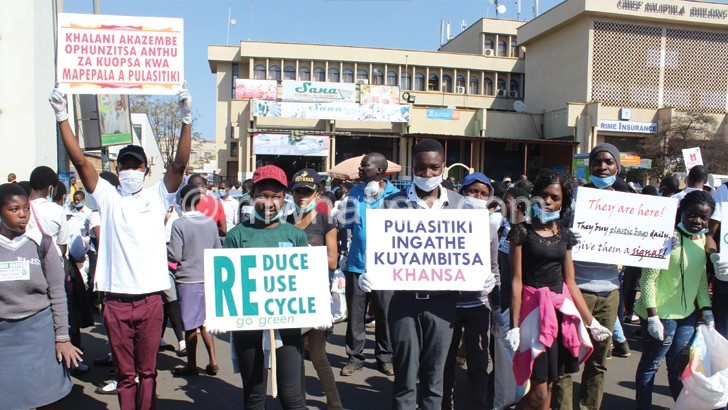Plastic ban mixed fortunes
Government’s ban on thin plastics threatens 5 000 jobs and 29 percent of exports from the manufacturing sector, a situation that the Manufacturing Association of Malawi warns country needs to careful examine the ban.
Recently published study by the United Nation Development Programme (UNDP) show that about 15 plastic manufacturing companies are in operation in Malawi, producing an estimated 75 000 tonnes of plastic per year, of which 80 percent is single-use plastic.

However, the cost of plastic pollution on municipalities, fisheries, agriculture, tourism and human health has been high than the cost of the ban, especially when the likely adaptive response and regional trends are taken into account, said UNDP study.
“Eliminating disposable single-use plastics will stimulate the market for more durable alternatives, such as re-useable bags and glass bottles, creating new job opportunities. This has been observed in other countries as regulations and incentives have reduced single-use plastic usage.
“Small business opportunities can be fostered and can potentially be of greater value to the poor. Moreover, as plastic reduction policies take hold across the continent, this also brings the continued viability of Malawi’s plastic exports into question,” reads the report in part.
But Manufacturing Association of Malawi chairperson Rex Nyahoda fears loss of jobs and revenues.
He said if the industry closes—with Malawi’s porous borders and smuggling—the country will still be flooded with imported single-use plastics.
“The industry is prepared to procure a machine that can recycle plastics where environmental issues can be saved. Let’s start by looking at how we can make sure it is a win-win situation.
“Neighbouring countries such as Mozambique and South Africa are able to allow plastic of less than 20 microbes, yet we have banned it in Malawi. We have just looked at firms that are manufacturing plastic and not bringing to task the users,” he said.
Environmental Affairs director Oliver Kumbemba last month said government will start disposing off all thin plastics.
“We will not give manufacturers a grace period to finish selling stocks piled in their warehouses following the Malawi Supreme Court of Appeal ruling in which it upheld the ban. The case has been in court for three years and manufacturers were still producing thin plastics of less than 60 microns despite being aware of the ban,” he warned.
Kumbemba said those who fail to comply with the Environmental Management (Plastics) Regulations will face imprisonment for a minimum period of three months or a minimum fine of K10 million.
In 2018, The Lilongwe Wild Life Trust also found out in its study that thin plastics make up of 8.5 percent of waste generated in the country.
The Environment Management Regulations provides for exemptions to the ban considering lack of appropriate alternatives and health implications that could arise if some products are not well packaged.
However, according to Kumbemba, the ban will not apply to plastics used for wrapping bread, fresh fish products and fresh poultry products. Other plastics which will not be confiscated include those used for wrapping fruits or nuts, confectionary products and other food staffs.





